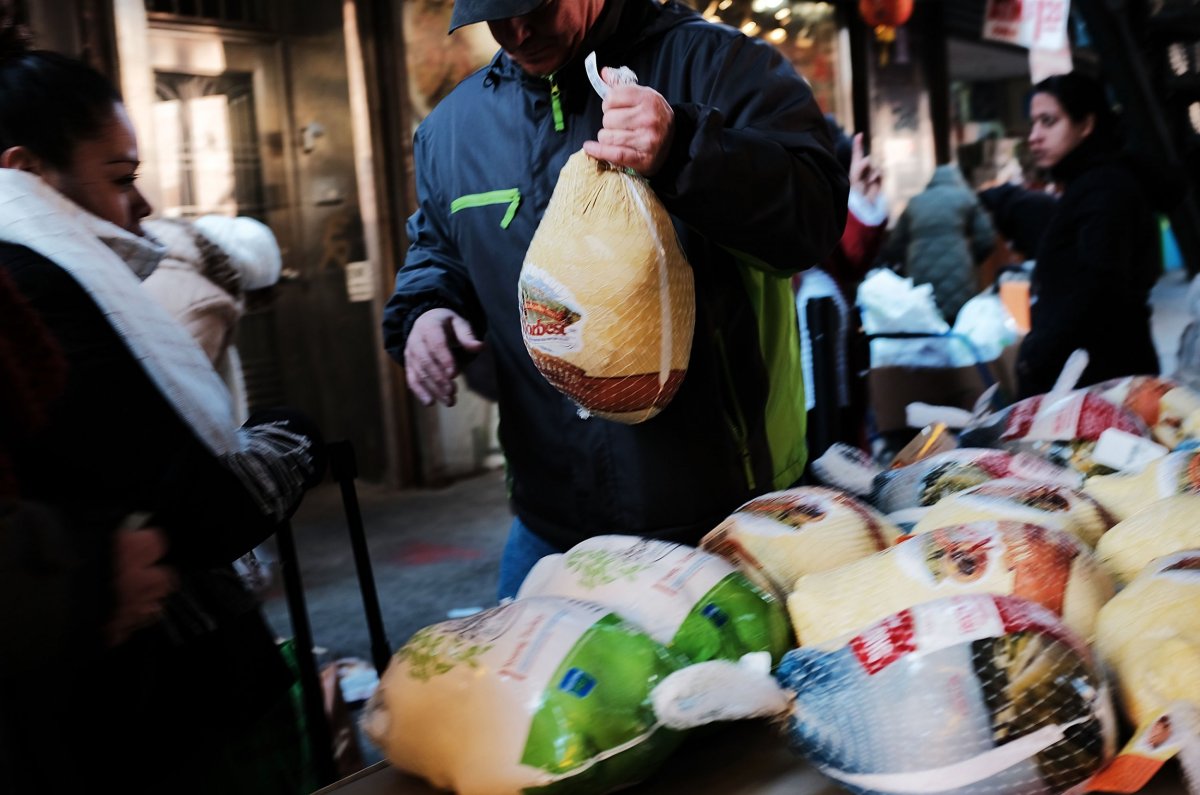Everyone pretty much agrees cooking a turkey for Thankgiving that actually tastes good can prove to be difficult. But hell, just thawing a turkey for Thanksgiving can be a daunting task.
But don't worry, we've got you covered on how you should get the bird defrosted for the big day on Thursday. It's not so bad, it just takes a little time and planning.
First of all, the best way to thaw a frozen turkey is in the fridge. If the internal temperature of food gets above 40 degrees Fahrenheit, you're risking bacteria and getting your friends and family sick. Using the refrigerator (versus leaving a turkey on the counter, or on the porch on a chilly day) allows for a regulated, constant temperature, which is your friend in this situation. All you have to do is place the turkey (you can keep the wrapper on, if it has one) in some kind of container to catch any juices, then let it sit in the fridge and wait.
Here are the thaw times recommended for different weights of birds from the food safety and inspection service division of the United States Department of Agriculture (USDA).
4 to 12 pounds — 1 to 3 days
12 to 16 pounds — 3 to 4 days
16 to 20 pounds — 4 to 5 days
20 to 24 pounds —5 to 6 days
Now, that's not quite as specific as you might need, but Butterball (turkey experts if there ever were turkey experts) has you covered there. The company recommends at least 1 day of thawing for every 4 pounds the turkey weighs. Once the bird is thawed, you'll want to use it within four days, according to Butterball.

Now, if you're in a pinch and don't have the time necessary to do a fridge thaw, there are other methods. You can microwave the bird—if you have a small turkey or a large microwave—and for that you'll basically just want to follow the microwave's instructions. This isn't a preferred method, however. The microwave will likely cook parts of the bird while you work to thaw other parts, which might give you a bad product once you roast the turkey. Also, because part of the bird cooks in the microwave, you have to fully cook the turkey right after you thaw it or risk bacteria.
The better option in a time crunch is a cold water thaw. It's not ideal but it'll work. Tightly wrap the turkey inside a plastic bag—again you need a tight seal—then submerge the whole thing in cold tap water. You'll still need to cook the bird right away after it's thawed but parts of the bird won't get cooked. Here are the times recommend for cold-water thawing from the USDA.
4 to 12 pounds — 2 to 6 hours
12 to 16 pounds — 6 to 8 hours
16 to 20 pounds — 8 to 10 hours
20 to 24 pounds — 10 to 12 hours
Butterball estimates a cold-water thaw will take about 30 minutes per pound and, importantly, recommends you change the water out completely every 30 minutes. And, Butterball recommends, if you cannot completely submerge the entire turkey, then you should rotate it every 30 minutes to keep the bird chilled.
So, there it is. All you'll have left to do is cook the damn thing. (Don't worry: We've got you covered there too.)
Uncommon Knowledge
Newsweek is committed to challenging conventional wisdom and finding connections in the search for common ground.
Newsweek is committed to challenging conventional wisdom and finding connections in the search for common ground.
About the writer
Reporter, covering a bit of everything.
To read how Newsweek uses AI as a newsroom tool, Click here.








